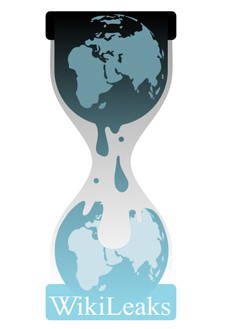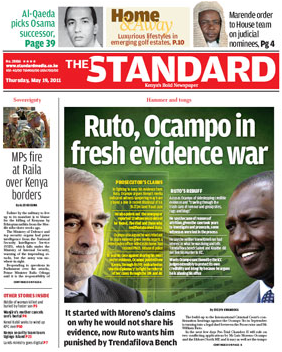
 After 17 months in confinement, Bradley Manning will appear before court on December 16, for an Article 32 pretrial hearing, his lawyer announced today.
After 17 months in confinement, Bradley Manning will appear before court on December 16, for an Article 32 pretrial hearing, his lawyer announced today.
The hearing, expected to last 5 days, will take place at Fort Meade, Maryland and will be held publicly “with the exception of those limited times where classified information is being discussed”.
The primary purpose of this hearing is to evaluate the US Government’s case against Manning.
Supporters will be outside the Court as he arrives, for a demonstration also tied to the celebration of his 24th birthday on the following day, December 17.
On December 17,
please write or send small gifts to Bradley Manning.
And don’t forget you can also contribute to his defense with a donation.

This is a "WikiLeaks News Update", a daily news update of stories that are obviously related to WikiLeaks and also freedom of information, transparency, cybersecurity, and freedom of expression. All the times are GMT.
- See @wlfind for some of the latest information found in the newly released WikiLeaks cables.
>> Updates on WikiLeaks news from #wlfind twitter hashtag (as curated by @wikileaks):
* Israel: A promised land for organized crime?
* German export of 184 lethal viruses to US Army for breeding.
* The cable on German spy sats & the BND that Der Spiegel decided not to publish.
* Video surveillance in Germany, an interesting perspective from the Duesseldorf Police Chief.
* Belarus moves to control the Internet based on Sweden, France, Germany, US.
* US embassy reports on human cloning and UFO cult in Canada.
* Kenya: Mungiki history traced to back to 1989 by US embassy.
* UN: "Collateral Murder" incident happened before. Reuters photojournalist shot at Abu Ghraib. No prosecution.

This is a "WikiLeaks News Update", a daily news update of stories that are obviously related to WikiLeaks and also freedom of information, transparency, cybersecurity, and freedom of expression. All the times are GMT.
08:30 PM ‘U.S. supplied weapons “lost” by the Honduran military turned up in Mexico and Colombia’ via AlterNet.
A cable dating from 2008 documents how weapons supplied to the Honduras the U.S. Foreign Military Sales Program end up in the hands on drug trafficking organizations in Mexico and Colombia.
07:55 PM Major General Hussein Ali had been warned against shoot-to-kill order in 2008, a recently released cable titled ‘Kenya : Behind a calm façade, hardliners prepare for more violence’ shows.
"we believe that the established rules of engagement and situation-specific circumstances should continue to dictate minimal use of deadly force", U.S. ambassador Ranneberger states in the cable.
Hussein Ali is one of six suspects in the post-election violence case. Wikileaks cables will be used in court by chief prosecutor Ocampo as evidence against three other suspects.
04:45 PM Minileaks, el Wikileaks 'made in Spain' : a spanish website based on the WikiLeaks model, aiming to expose even the smallest abuses.
Cables released from WikiLeaks provide important material in the ‘evidence war’ between ICC prosecutor Luis Moreno-Ocampo and Kenyan politician William Ruto.

The cables support Moreno-Ocampo’s arguments that exposing information about critical witnesses would be a severe threat to them and that allegations on Ruto’s involvement in the extrajudicial killings in 2007-2008 post-election violence are recognized by the U.S. embassy, which is far from ‘rubbish rumors picked up by rag blogs’ as Ruto criticized the evidences the allegation is based on.
William Ruto, the Waki Commission, and the tragedy of extrajudicial killings during 2007-2008 post-election violence in Kenya
Extrajudicial killings during 2007-2008 post-election period in Kenya has been condemned internationally, mainly by the UN Special Rapporteur on extra-judicial killings, Alston. WikiLeaks received the Amnesty 2009 New Media Award due to its notable work on leaking and reporting about the hundreds of extrajudicial killings tacitly approved by the Kibaki government and widely conducted by Kenyan Police force working with armed militias.
Among the leaked material is a report titled The Cry of Blood: Report on Extra-Judicial Killings and Disappearances, which is written by the Kenya National Commission on Human Rights (KNCHR). The UN acknowledged the report’s credibility after confirming that the information found in the report is backed by investigation results of other civil society organizations and that of the preliminary research done by UN Special Rapporteur team in 2009.
Below are photographs taken as evidences of extrajudicial killings in the report:
Foreign Policy provides a summary by country of US state policy for Somalia, Sudan, Zimbabwe, Pakistan, Kenya, Nigeria, Burma, North Korea, Eritrea, including what the state cables have so far revealed.
By now, you've read the WikiLeaked headlines, illuminating the inner workings of U.S. policy in Iraq and Afghanistan, or detailing the intractable regimes in Iran and North Korea. But what does Cablegate have to say about the world's forgotten conflicts -- the dimmer outposts of U.S. influence where Washington arguably has even bigger messes to confront? FP went through the archives with an eye to our 2010 Failed States issue to see what light the cables shed on these benighted places -- and whether the cables themselves may disrupt the often delicate balancing act of diplomacy.
Theme by Danetsoft and Danang Probo Sayekti inspired by Maksimer